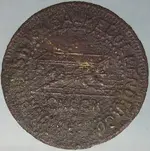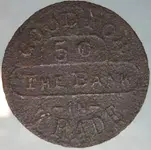Bruce--
Sorry if I didn't make myself clear. The Brunswick company often did finance the billiard tables for their customers, the pool halls. In the pre-Phrohibition times they often put up money so the businessman could get a liquor license as well. In this case the pool hall was named "The Bank" - probably because they were in the same building as a bank. The pool halls used tokens in their business and usually ordered at least 100 of them and often 1000 or so. The tokens were used in many ways, most often they were used as change for liquor and cigars. The classic example is where the tokens are valued at 12½¢, a good cigar or shot of whiskey was priced at "2 for a quarter". The customer would buy one drink, plunk down a quarter, and get his drink plus a 12½¢ token in change. The token could be used for the next one. In the case of a billiard hall, it may have cost 5¢ to play a game. The customer would pay the person at the cash register 5¢ and get a token in return. Then, there would be some "clerk" running the pool tables who would collect the token from each player before the game. The idea was that the clerk might pocket cash, thus robbing the owner, so he was only allowed to handle tokens. In addition, a "friendly game of pool" often involved wagers. Since it may have been illegal to gamble for cash and/or since the clerk would be the one to handle the bets, the players might buy more of the tokens (with cash) from the person at the till and use them as stakes in the game. So it the sheriff should happen to drop in, they could honestly say they weren't gambling for money. When the games were all done, the winner could (in rare cases) trade his tokens in for cash. But more often, the proprietor of the pool hall would only let the winner use the tokens "in trade" at the candy or cigar counter, or at the bar, or the next time the customer wanted to play a game of pool. It is in this latter case where we come in. The guy had all he could drink, stumbled home, and on the way lost the token out of his pocket. The token got covered up and waited a century or so for some dude to come by with a new-fangled metal detector and find it.
John in ID





